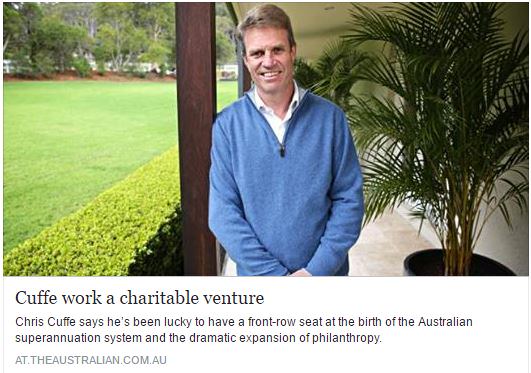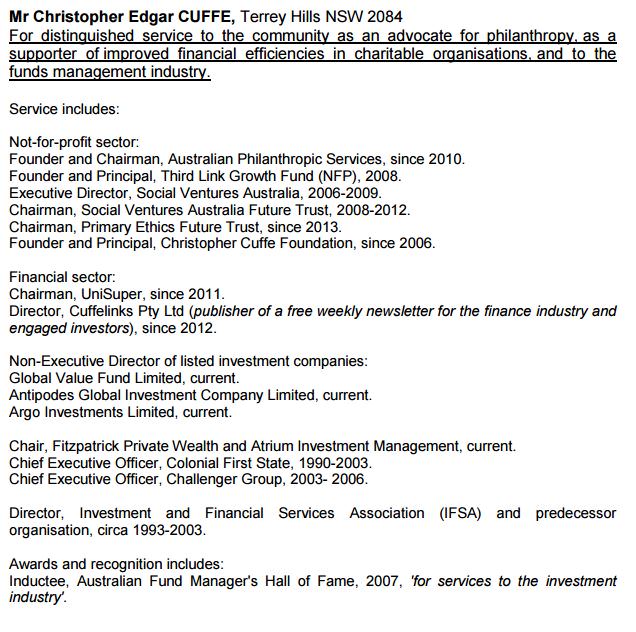Great news that the Cofounder of Cuffelinks, Chris Cuffe, was awarded the Officer of the Order of Australia for “distinguished service to the community as an advocate for philanthropy, as a supporter of improved financial efficiencies in charitable organisation and to the funds management industry”.
Here's Andrew White's article in The Australian following the announcement.

Queen’s Birthday Honours 2017: Chris Cuffe backs charity values
Chris Cuffe says he’s been lucky to have a front-row seat at the birth of the Australian superannuation system and the dramatic expansion of philanthropy.
He has played a major role in both, building Colonial First State from a start-up business to the biggest fund manager in the land over 12 years as chief executive, before going on to establish a number of charitable ventures that now help wealthy families give away tens of millions of dollars a year.
“I have heard people say that high net worth people are stingy when it comes to charity, but I don’t think that is right,’’ Mr Cuffe said.
“No, all people have it in their DNA to help other people. Everyone has the willingness, but you have to give them the tools.”
Mr Cuffe is awarded an Officer of the Order of Australia for “distinguished service to the community as an advocate for philanthropy, as a supporter of improved financial efficiencies in charitable organisation and to the funds management industry”.
Mr Cuffee founded the Third Link Growth Fund — an investment vehicle that gives away $2 million a year that it saves from having fund managers hand-picked by Mr Cuffe waive their management fees — and Australian Philanthropic Services. Since being set up in 2010 APS has helped about 300 families set up charitable foundations or what are legally known as private ancillary funds. It helps oversee almost $450m in those funds, as well as advising on grants and donations.
Its board includes ANZ chairman David Gonski — who was instrumental in lobbying the Howard government for the legal and tax changes that allows the funds to be established — Tim Fairfax, Sydney University Chancellor and former QBE Insurance chairman Belinda Hutchinson and, as of this month, former Westpac chief executive Gail Kelly.
The switch to philanthropy came in 2006 when he stepped down from his second CEO job at the then Packer-family-backed Challenger Financial Services and met former Macquarie banker and founder of Social Ventures Australia, Michael Trail, who has been awarded an AO. Mr Trail convinced him he could use the skills he acquired in the business world to help others and he joined SVA for 3½ years. “Because I was fortunate enough to have the resources and the time, still had plenty of energy and was well connected I thought I can employ (my) skills in helping other people,’’ he said.
A former accountant who left the profession in 1985 to go into funds management, Mr Cuffe witnessed the birth of the compulsory super which is now, at $2 trillion, bigger than the nation’s annual GDP. Colonial First State was acquired by CBA and became the biggest and best performing fund manager before Mr Cuffe left in 2003.
Courtesy of The Australian, 12 June 2017
